必修一限制性定语从句与非限制性定语从句教学内容
高中英语定语从句(限制性、非限制性定语从句)
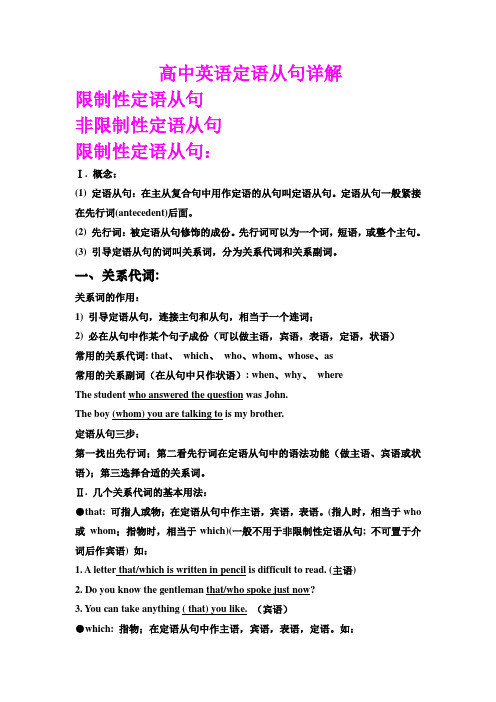
高中英语定语从句详解限制性定语从句非限制性定语从句限制性定语从句:Ⅰ. 概念:(1) 定语从句:在主从复合句中用作定语的从句叫定语从句。
定语从句一般紧接在先行词(antecedent)后面。
(2) 先行词:被定语从句修饰的成份。
先行词可以为一个词,短语,或整个主句。
(3) 引导定语从句的词叫关系词,分为关系代词和关系副词。
一、关系代词:关系词的作用:1) 引导定语从句,连接主句和从句,相当于一个连词;2) 必在从句中作某个句子成份(可以做主语,宾语,表语,定语,状语)常用的关系代词: that、which、who、whom、whose、as常用的关系副词(在从句中只作状语): when、why、whereThe student who answered the question was John.The boy (whom) you are talking to is my brother.定语从句三步:第一找出先行词;第二看先行词在定语从句中的语法功能(做主语、宾语或状语);第三选择合适的关系词。
Ⅱ. 几个关系代词的基本用法:●that: 可指人或物;在定语从句中作主语,宾语,表语。
(指人时,相当于who 或whom;指物时,相当于which)(一般不用于非限制性定语从句; 不可置于介词后作宾语) 如:1. A letter that/which is written in pencil is difficult to read. (主语)2. Do you know the gentleman that/who spoke just now?3. You can take anything ( that) you like. (宾语)●which: 指物;在定语从句中作主语,宾语,表语,定语。
如:1. The book which/that was on the desk was bought by my father.(主语)2. The book (which/that) I bought yesterday is very interesting.(宾语)●who, whom, whose:who: 主格, 在从句中作主语,在口语或非正式用法中作宾语; 只可指人whom: 宾格,在从句中作宾语; 只可指人whose: 属格,在从句中作定语,可指人也可指物。
限定性定语从句和非限定性定语从句教案
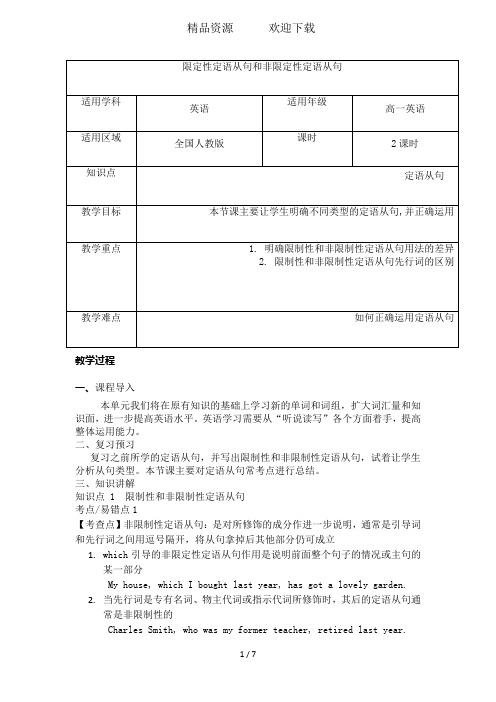
教学过程一、课程导入本单元我们将在原有知识的基础上学习新的单词和词组,扩大词汇量和知识面,进一步提高英语水平。
英语学习需要从“听说读写”各个方面着手,提高整体运用能力。
二、复习预习复习之前所学的定语从句,并写出限制性和非限制性定语从句,试着让学生分析从句类型。
本节课主要对定语从句常考点进行总结。
三、知识讲解知识点 1 限制性和非限制性定语从句考点/易错点1【考查点】非限制性定语从句:是对所修饰的成分作进一步说明,通常是引导词和先行词之间用逗号隔开,将从句拿掉后其他部分仍可成立1.which引导的非限定性定语从句作用是说明前面整个句子的情况或主句的某一部分My house, which I bought last year, has got a lovely garden.2.当先行词是专有名词、物主代词或指示代词所修饰时,其后的定语从句通常是非限制性的Charles Smith, who was my former teacher, retired last year.3.非限制性定语从句可将整个主句作为先行词, 对其进行修饰, 这时从句谓语动词要用第三人称单数,Liquid water changes to vapor, which is called evaporation.4.有时as也可用作关系代词5.在非限定性定语从句中,不能用关系副词why和关系代词that,而用who,whom代表人,用which,whose代表事物,如果需要用why,可用for which 代替【易错点】正确区分限制性和非限制性定语从句考点/易错点2【考查点】关系副词引导的从句可以由“介词+关系代词”引导的从句替换This is the house in which I lived two years ago.This is the house where I lived two years ago.【易错点】选取正确的介词考点/易错点3【考查点】由as, which 引导的非限定性定语从句,as和which可代整个主句,相当于and this或and that。
Unit1 非限制性定语从句(教学课件)-高中英语人教版(2019)选择性必修第一册

3. 先行词不同
限制性定语从句: 可以修饰名词或代词; 非限制性定语从句: 可以修饰member the man who taught us English? She and her family bicycle to work, which helps them keep fit.
He is an English teacher who likes singing songs.
先行词 关系代词 定语从句
定 语
关系代词
指人
that(主语/宾语/表语), who(主语/宾语), whom(宾语), whose(定语), as(主语/宾语/表语)
从
指物 that, which(主语、宾语), whose, as
3. _p_r_o_p_e_r_ti_e_s_ qualities or characteristics of something
Her team examined ... for their medical properties. 4. ___l_iq_u_i_d___ a kind of substance that flows freely, such as water or milk
They then tried ... using the liquid obtained from this to treat malaria, ... 5. __su_b_s_t_a_n_ce__ physical material that exists
限制性定语从句和非限制性定语从句课件
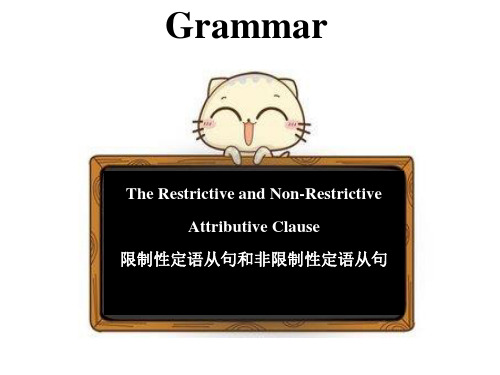
4. Beijing is a beautiful cityw__h_e_re _ I went last summer. 5. The factoryw__h_e_r_eI worked was 9km away from my house. 6. The time _w__h_e_n_ I arrived was late at night. 7. There is no reason _w__h_y__ you should leave.
A. the time B. what time C. that time D. which time
3. Didn't you see the man D
?
A I nodded just now
B. to whom I nodded just now
C. I nodded to him just now D. that I nodded to just now 4. Can you lend me the novel ___D____ the other day?
happy. 以上句中的which都指前面整个句子的内容。
4. Though he has lots of money, he still rides his old bike, which was bought ten years ago.
注意
逗号不可以连接两个句子
不定代词/数词/名词+ 介词+which /whom + 从句 She has three sons, all of whom joined the army. She has three sons, two of whom were engineers. I want a room, the window of which faces the south.
限定性定语从句与非限定性定语从句
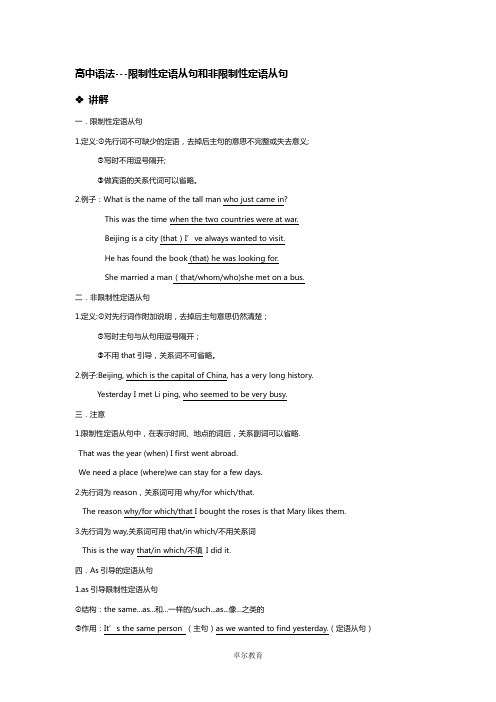
高中语法---限制性定语从句和非限制性定语从句讲解一.限制性定语从句1.定义:①先行词不可缺少的定语,去掉后主句的意思不完整或失去意义;②写时不用逗号隔开;③做宾语的关系代词可以省略。
2.例子:What is the name of the tall man who just came in?This was the time when the two countries were at war.Beijing is a city (that)I’ve always wanted to visit.He has found the book (that) he was looking for.She married a man(that/whom/who)she met on a bus.二.非限制性定语从句1.定义:①对先行词作附加说明,去掉后主句意思仍然清楚;②写时主句与从句用逗号隔开;③不用that引导,关系词不可省略。
2.例子:Beijing, which is the capital of China, has a very long history.Yesterday I met Li ping, who seemed to be very busy.三.注意1.限制性定语从句中,在表示时间、地点的词后,关系副词可以省略.That was the year (when) I first went abroad.We need a place (where)we can stay for a few days.2.先行词为reason,关系词可用why/for which/that.The reason why/for which/that I bought the roses is that Mary likes them.3.先行词为way,关系词可用that/in which/不用关系词This is the way that/in which/不填I did it.四.As引导的定语从句1.as引导限制性定语从句①结构:the same...as...和...一样的/such...as...像...之类的②作用:It’s the same person (主句)as we wanted to find yesterday.(定语从句)这和我们昨天要找的是同一个人。
必修一限制性定语从句与非限制性定语从句
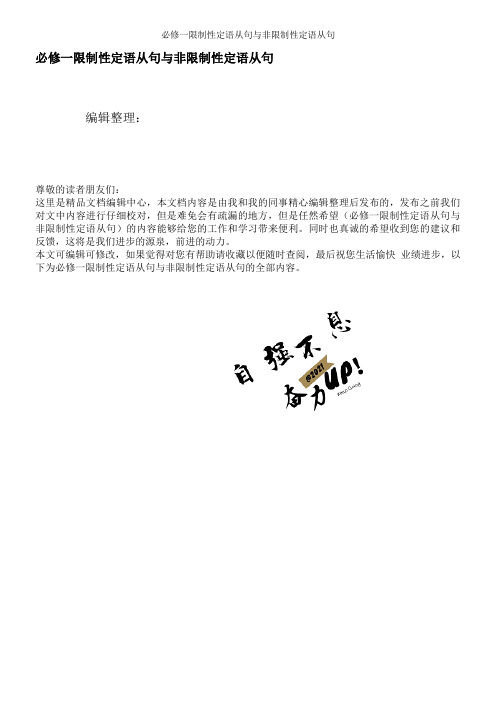
必修一限制性定语从句与非限制性定语从句编辑整理:尊敬的读者朋友们:这里是精品文档编辑中心,本文档内容是由我和我的同事精心编辑整理后发布的,发布之前我们对文中内容进行仔细校对,但是难免会有疏漏的地方,但是任然希望(必修一限制性定语从句与非限制性定语从句)的内容能够给您的工作和学习带来便利。
同时也真诚的希望收到您的建议和反馈,这将是我们进步的源泉,前进的动力。
本文可编辑可修改,如果觉得对您有帮助请收藏以便随时查阅,最后祝您生活愉快业绩进步,以下为必修一限制性定语从句与非限制性定语从句的全部内容。
定语从句(一)一.形容词作定语与从句作定语作比较。
I don’t like lazy people。
I don’t like people who is lazy.二。
先行词与关系代词1.I don’t like people who never keep their work.2.I like guys who aren’t serious and who have a good sense of humor.3.He said that he had no time, which isn’t true。
被定语从句修饰的对象称为先行词重复指代先行词、起连接主句和从句的作用,并且在定语从句中充当一定成分的连接词称为关系词The ruler of an kingdom warned that any man that did not tell the truth would be punished 。
三.关系词在从句中充当的成分1.用作主语(注:定语从句一般要紧跟在它所修饰的名词后面;定语从句中的谓语动词形式是由关系词所指代的先行词来决定的.)The woman who lives next door is a famous dancer.(The woman is a famous dancer and she lives next door。
高中英语人教版必修一第一单元语法非限制性定语从句PPT
必修第一册第一单元重点语法
定语从句的定义:
定语从句是由关系代词或关系副词引导的从句,其作用是作定语修饰主 句的某个名词成分,相当于形容词。 定语从句又分为限制性定语从句和非限制性定语从句。
限制性定语从句就是对某个名词(先行词)起约束作用,使该词含义 更具体。
如girl, a girl who is beautiful. 对girl这个词限定起来,而不是随便什么 girl。
A: which B: where C: in which D: what
句式分析,此句不缺少东西, 如果去掉从句,句意完整。
be famous for...
3: Last summer we visited the West Lake, __ Hangzhou is famous in the world.
He said that he had never seen her before, _______ was not true.
In the presence of so many people he was little tense, ______ was understandable.
which在非限制性定语从句中可指代和修饰的是主句中的名词,形容词,短语,其 他从句或整个主句,在从句中作主语,动词宾语,介词宾语或表语。
3: The boy, whose father is an engineer, studies very hard.
总结: 1:非限制性定语从句起补充说明的作用, 在句子中不充当成分,缺少也不会影响全 句的理解,它与主句之间通常用逗号隔开。
1:who John,__w_h_o_ sells ancient vases,is an old friend of my father’s. His sister,__w_h_o__ works in an antique shop,is coming to see him tomorrow.
高考英语语法复习之限制性定语从句和非限制性定语讲义
高中英语语法复习之限制性定语从句和非限制性定语定义和用法在英语语法中,定语从句是用来修饰名词或代词的句子成分,通常分为限制性定语从句和非限制性定语从句两种。
限制性定语从句和非限制性定语从句是英语语法中两个重要的概念。
限制性定语从句是指用来修饰一个名词或代词的从句,这个从句在句子中充当定语的作用,对名词或代词起限定、说明的作用。
与之相反,非限制性定语从句通常用来进一步说明被修饰的名词或代词,起到补充说明的作用,它不能充当主语、宾语等成分,并且通常可以被省略。
限制性定语从句通常由that、which、who、whom、whose等引导词引导,也可以由as、when、where、why等引导词引导。
限制性定语从句通常与主句之间需要用逗号隔开,而且通常放在主句之后。
例如:The book, which I read last week, is really interesting.(限制性定语从句)The man, who is a doctor, can help you.(限制性定语从句)非限制性定语从句则没有这些限制,它可以充当主语、宾语、表语、定语等成分,并且通常可以被省略。
非限制性定语从句通常由that、which、who、whom、whose等引导词引导,也可以用as、when、where、why等引导词引导。
例如:The book, that I read last week, is really interesting.(非限制性定语从句)The man, who is a doctor, can help you.(非限制性定语从句)需要注意的是,非限制性定语从句和限制性定语从句在句子中的作用不同,因此需要根据具体情况来选择合适的定语从句类型。
限制性定语从句是先行词在定语从句中充当主语或宾语,对先行词起修饰和限制作用,二者缺一不可。
限制性定语从句和非限制性定语从句是英语语法中的两个重要概念。
限制性定语从句和非限制性定语从句讲解课件共25张
与其他从句的区别
与非限制性定语从句的区别
限制性定语从句对所修饰的名词或代词进行或代词的附加说明,可以 省略不影响句子意义。
与同位语从句的区别
限制性定语从句是对名词或代词的修饰限定,而同位语从句 则是对名词或代词的补充说明,两者在功能和意义上都有所 不同。
定义
限制性定语从句用于修饰名词或代词 ,对所修饰的名词或代词在意义上进 行限定,使其更具体、更明确。
特点
与主句关系紧密,不可省略,如果省 略会影响句子的完整性或意义。
用法与例句
用法
在句子中,限制性定语从句紧跟在先行词后面,通过关系代词或关系副词引导, 对先行词进行修饰限定。
例句
The book that I borrowed from the library is very interesting. (关系代词 that引导)
限制性定语从句和非限 制性定语从句讲解课件
目录
Contents
• 引言 • 限制性定语从句 • 非限制性定语从句 • 限制性定语从句与非限制性定语从
句的区别 • 练习与巩固 • 总结与回顾
01 引言
课程介绍
课程背景
介绍定语从句在英语语法中的重 要地位,以及学习定语从句对于 提高英语表达和理解能力的意义 。
03 非限制性定语从句
定义与特点
定义
非限制性定语从句是对先行词的附加说明,与主句关系不紧密,去掉后不影响主 句意思。
特点
使用逗号与主句隔开,对先行词进行补充说明,但不强调先行词与从句的关系。
用法与例句
用法
在句子中充当定语,修饰名词或代词。
例句
The book, which was written by a famous author, was highly recommended.(这本书是由著名作 家所写,备受推荐。)
2024届高考英语复习限制性定语从句和非限制性定语从句课件
区别三:否定意义的非限制性定语从句 不能用as引导。 Tom has passed the exam, _w_h__ic_h__ nobody knows.
He came to my birthday party, ___a_s____ I
expected. He came to my birthday party, __w_h_i_c_h___ I didn’t expect at all.
相同点:as和which 都可以在定语从句里做主语,或者宾语,指代前
面的整个句子的意思;
区别一: as 引导的非限制性定语从句相当于插入语,位置 灵活;而which引导的非限制性定语从句只能放主句后 面
As we know, smoking is harmful to one's health. 如我们所知,吸烟有害健康。
一个中年女子杀害了其丈夫,这事令我十分恐 惧。
解析: 从语境可知,令我恐惧的内容应为中年 女子杀害了其丈夫这整个一件事,因此先行词 为整个主句,此时应由which引导定语从句。
(2) A five-year-old boy can speak two foreign languages, which surprises all the people present. 一个五岁的男孩会讲两门外语, 令所有在场 的人感到非常惊讶。 解析: 从语境可知, 令所有在场的人感到惊讶 的内容是一个五岁男孩会讲两门外语这整个 一件事,因此先行词为整个主句,此时应由 which引导非限制性定语从句。
区导别定四从; su,不ch可....用..aws;hsioc.h.....as;as.....as结构里,后一个as引
He is such a lazy man as nobody wants to work with (as是work
- 1、下载文档前请自行甄别文档内容的完整性,平台不提供额外的编辑、内容补充、找答案等附加服务。
- 2、"仅部分预览"的文档,不可在线预览部分如存在完整性等问题,可反馈申请退款(可完整预览的文档不适用该条件!)。
- 3、如文档侵犯您的权益,请联系客服反馈,我们会尽快为您处理(人工客服工作时间:9:00-18:30)。
定语从句(一)一.形容词作定语与从句作定语作比较。
I don’t like lazy people.I don’t like people who is lazy.二.先行词与关系代词1.I don’t like people who never keep their work.2.I like guys who aren’t serious and who have a good sense of humor.3.He said that he had no time, which isn’t true.被定语从句修饰的对象称为先行词重复指代先行词、起连接主句和从句的作用,并且在定语从句中充当一定成分的连接词称为关系词The ruler of an kingdom warned that any man that did not tell the truth would be punished .三.关系词在从句中充当的成分1.用作主语(注:定语从句一般要紧跟在它所修饰的名词后面;定语从句中的谓语动词形式是由关系词所指代的先行词来决定的。
)The woman who lives next door is a famous dancer.(The woman is a famous dancer and she lives next door. )2.I like guys and they have a good sense of humor.3.Anger is a thief who steals away the nice moments.4.There is this difference between happiness and wisdom: the person who thinks himself the happiest man really is so, but the person who thinks himself the wisest is generally the greatest fool.5.I’m talking about friends about who care deeply about each other, who support each other, who make life worth living.2.用作动词的宾语1.I’ d really like to find a friend and I can trust him completely.I’d rally like to find a friend who I can trust (him?) completely.2.It’s hard to have a friend and you can trust him completely.3.He is the best teacher who I have never seen.4.He is the student who teacher likes to praise for his hard work.3.作从句中介词的宾语1.I’m talking about friends and you can share almost everything with them.I’m talking about friends who you can share almost everything (with them).2.I hope I never have a boss and I can talk to him about my problems.3.I’d prefer someone who I have sth. in common with--- who I can talk ( ) easily.4.I like the people who I work ( ).(作宾语的关系词可以省去)三.关系代词与先行词的搭配关系(一).关系代词:who, whom which, that 和whose1.指“人”关系代词 who 和whom 的区别(1)who 的前面不能与介词搭配使用The engineer with (who; whom) my father works is about 50 years old.(2 ) whom 在定语从句不能做主语,但可作宾语或表语。
A rich people is one (who. whom) has the most. but is one (who, whom) needs the least.2.表示人或物的所有关系,用whose“whose+ n.”在从句中可作主语,动词的宾语或者介词的宾语(1) I know a friend . His brother is a pop singer.I know a friend whose brother is a pop singer.(2) These children sit in a schoolroom , its windows are all broken.(3)When I looked through the window, I saw a girl whose beauty took my breath away.(4)It was a meeting whose importance I did not realize at the time.3.先行词指“物”,用关系代词which(1)We are studying sentence . They contain abjective clauses.We are studying sentence which contain abjective clauses.(2)Anger is a wind which blows out the lamp of the mind.(3)Perhaps it is human to appreciate little that which we have and to long for that which we have not.(或许,“不惜已获,贪求不得”是人类共同的弱点吧) (4)He likes climbing mountains, which is a good exercise.(5)Tom was late ,which surprised me.(which 除了可以指代单个的名词外,还可以指代短语或者句子)4.that 可指代“人”,也可指代“物”,that 可替换who 或which不能用that的情况1.that 不用于非限制性定语从句中2.that 不能用于介词的后面(和who一样)Too many people spend money which they haven’t earned , to buy things which they don’t want, to impress people who they don’t like.最好用that 的情况,共参考~1.当先行词同时出现“人”,和“物”时,用that.2.先行词为指“物”的all, little, few , much, none 和 the first 时,用that.All that glitters is not gold.This book contains little that is useful.There is not much that can be done.As long as you stand up to the difficulties, there are none that cannot be overcome.3.先行词是不定代词 something, anything, nothing, 和 everything 时,一般用that.4.先行词被any , only ,all, every , no, some, much, few, little ,序数词,形容词的最高级,the only ,the one, the very ,the right, the last 等成分修饰时,用that.Tell us all things that you know.There is no difficulties that they can’t overcome.He is the only man that can speak four languages in our company.四,关系副词的用法1.when的用法when可以引导限制性和非限制性定语从句,其先行词须是表示时间的名词,如day,year,time 等。
(1)先行词指时间I’ll never forget the time when I met you.The day when we stop learning is the day when we die.My favourite season is spring, when the earth seems born again.(2)关系副词when在从句中作时间状语I’ll never forget the time which I spent in my college.I’ll never forget the day when we first met in the park.The day,(which. when) began brightly, ended with a violent storm.2.where 的用法(1)where指地点This is the town where I spent my childhood.Do you know any place where I can buy a new bike?(2)关系副词where在从句中地点状语This is the town where I spent my childhood.This is the town which I told you about before.I’ve never been to Beijing, but it’s the place .A. where I’d like to visitB. in which I’d like to visitC.I most want to visitD. that I want to visit it most3.why的用法用来表示原因,只引导限制性定语从句,先行词是reason等表示原因的名词This is the reason why I did n’t come here. (why 可否换成for which?)。
